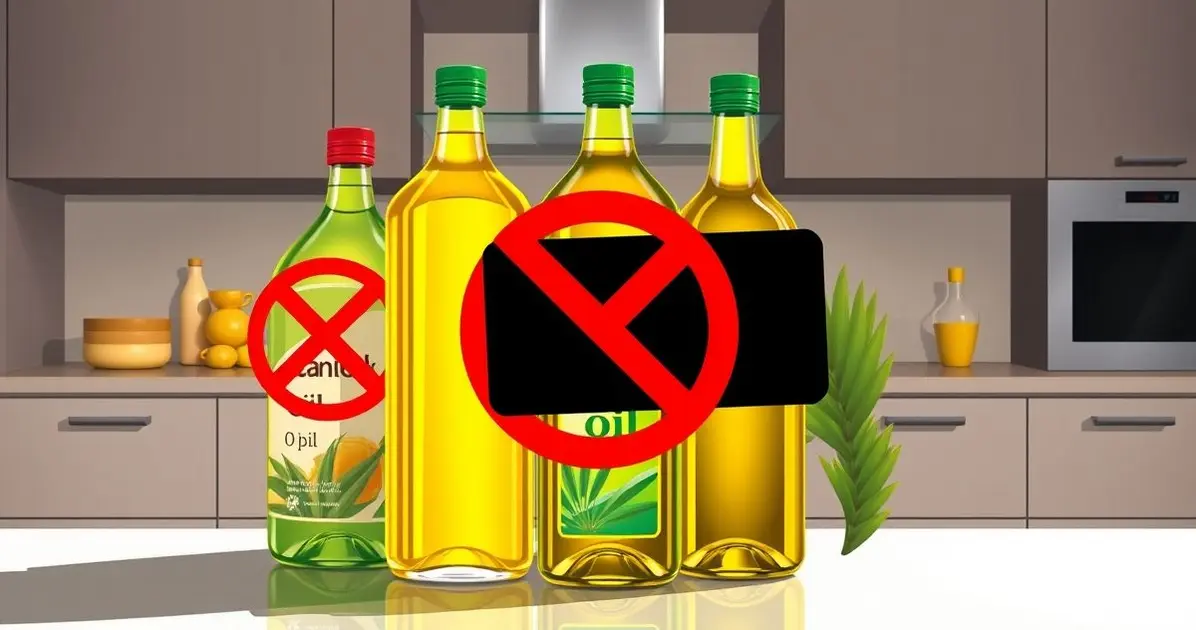Many popular cooking oils, like canola and soybean oil, can be detrimental to health due to their high omega-6 fatty acid content and processing methods. It’s important to identify which oils should be limited in your diet for better health.
What cooking oils are bad for you

Certain cooking oils may increase inflammation and contribute to health issues. Common culprits include highly processed oils like vegetable and corn oil. Understanding which oils to avoid can help you make healthier cooking choices and improve your overall diet.
Unhealthy Oils High in Saturated Fats
Unhealthy oils high in saturated fats are often found in many kitchens and processed foods, but they can pose risks to heart health and overall well-being. Understanding these oils is crucial for making informed dietary choices. Here’s a closer look at some of the most common unhealthy oils high in saturated fats:
1. Palm Oil: Palm oil is derived from the fruit of the oil palm tree and is widely used in cooking and processed foods. Key points include:
- Saturated Fat Content: Palm oil is approximately 50% saturated fat, which can raise LDL cholesterol levels when consumed in excess.
- Environmental Concerns: The production of palm oil is associated with deforestation and habitat destruction, raising environmental and ethical concerns.
2. Coconut Oil: Coconut oil has gained popularity in recent years for its unique flavor and purported health benefits. However, it is also high in saturated fats:
- Saturated Fat Content: Coconut oil is about 90% saturated fat, which can contribute to increased cholesterol levels if consumed in large amounts.
- Moderation is Key: While coconut oil may have some health benefits, such as containing medium-chain triglycerides (MCTs), it should be used in moderation within a balanced diet.
3. Other Saturated Fat-Rich Oils: In addition to palm and coconut oil, there are other oils and fats that are high in saturated fats:
- Butter: While not an oil, butter is often used in cooking and contains about 63% saturated fat. It can be a flavorful addition but should be used sparingly.
- Lard and Shortening: Lard (rendered pig fat) and shortening (often partially hydrogenated vegetable fats) are also high in saturated fats and can be found in baked goods and fried foods.
In summary, unhealthy oils high in saturated fats, such as palm oil and coconut oil, can negatively impact heart health when consumed excessively. Being mindful of these oils and opting for healthier alternatives—such as olive oil or avocado oil—can help promote better health and well-being in your cooking practices. Awareness of the types of fats in your cooking oils is essential for making nutritious choices that support a balanced diet.
The Risks of Omega-6 Fatty Acid-Rich Oils
The risks of omega-6 fatty acid-rich oils are an important consideration for health-conscious consumers. While omega-6 fatty acids are essential for the body, excessive consumption can lead to negative health effects. Here’s a closer look at the risks associated with these oils:
1. Imbalance of Omega-3 and Omega-6 Fatty Acids: A diet high in omega-6 fatty acids, such as those found in corn oil, soybean oil, and sunflower oil, can lead to an imbalance in the omega-3 to omega-6 ratio. Ideally, a balanced intake of both types of fatty acids is necessary for optimal health:
- Inflammation: Excessive omega-6 intake can promote inflammation in the body, which is linked to various chronic diseases, including heart disease, arthritis, and certain cancers.
- Compromised Heart Health: An imbalanced ratio of omega-6 to omega-3 fatty acids may contribute to increased cardiovascular risk factors, such as elevated blood pressure and cholesterol levels.
2. Sources of Omega-6 Fatty Acids: Many common cooking oils and processed foods contain high levels of omega-6 fatty acids, including:
- Corn Oil: Widely used in frying and processed foods, corn oil is high in omega-6s and can contribute to an imbalanced diet.
- Soybean Oil: Found in many packaged and processed foods, soybean oil is another significant source of omega-6 fatty acids.
- Sunflower Oil: Often used for cooking and salad dressings, sunflower oil is high in omega-6s and should be consumed in moderation.
3. Moderation is Key: While omega-6 fatty acids are essential for health, it is important to consume them in moderation. Balancing omega-6 intake with omega-3-rich foods, such as fatty fish, flaxseeds, and walnuts, can help mitigate the risks:
- Focus on Whole Foods: Incorporating whole, unprocessed foods into your diet can help reduce reliance on oils high in omega-6 fatty acids.
- Choose Healthier Oils: Opt for oils with a better balance of fatty acids, such as olive oil or avocado oil, which are rich in monounsaturated fats and have lower omega-6 content.
In summary, while omega-6 fatty acids are necessary for health, excessive consumption from certain oils can pose risks, including inflammation and heart health concerns. By being mindful of your dietary fat sources and balancing omega-6 intake with omega-3s, you can promote better health and well-being.

Understanding Trans Fats and Their Dangers
Understanding trans fats and their dangers is crucial for making informed dietary choices. Trans fats are a type of unsaturated fat that can be harmful to health, and they are often found in processed and fried foods. Here’s a closer look at what trans fats are and why they pose risks:
1. What Are Trans Fats? Trans fats are created through a process called hydrogenation, where hydrogen is added to liquid vegetable oils to make them solid at room temperature. This process improves the texture and shelf life of food products:
- Partially Hydrogenated Oils: These are the primary source of trans fats in the diet. They are commonly found in margarine, shortening, and many processed foods.
- Fully Hydrogenated Oils: While these oils do not contain trans fats, they are still processed and can be less healthy than unprocessed fats.
2. Health Risks Associated with Trans Fats: The consumption of trans fats has been linked to numerous health issues, making them particularly dangerous:
- Increased LDL Cholesterol: Trans fats raise levels of low-density lipoprotein (LDL) cholesterol, often referred to as “bad” cholesterol. Elevated LDL levels can lead to the buildup of plaque in arteries, increasing the risk of heart disease and stroke.
- Decreased HDL Cholesterol: Trans fats can also lower levels of high-density lipoprotein (HDL) cholesterol, known as “good” cholesterol. This further contributes to cardiovascular risk.
- Increased Inflammation: Diets high in trans fats have been associated with increased inflammation in the body, which is linked to various chronic diseases, including diabetes and certain cancers.
3. Regulatory Measures: Due to the health risks associated with trans fats, many countries have implemented regulations to limit their use in food products:
- Bans and Restrictions: Some regions have banned the use of partially hydrogenated oils in food products, while others require clear labeling of trans fat content on packaging.
- Consumer Awareness: Increased awareness about the dangers of trans fats has led consumers to seek healthier options, prompting food manufacturers to reformulate their products.
4. Healthier Alternatives: To minimize the risks associated with trans fats, it is essential to choose healthier alternatives:
- Use Natural Fats: Opt for natural fats such as olive oil, avocado oil, and butter in moderation, as these options contain healthier fats that can support heart health.
- Read Labels: Always check food labels for trans fat content and avoid products that list partially hydrogenated oils as ingredients.
In summary, understanding trans fats and their dangers is vital for making informed dietary choices. By being aware of the health risks associated with trans fats and opting for healthier alternatives, individuals can promote better heart health and overall well-being.
Making Nutritious Cooking Choices
Making nutritious cooking choices is essential for promoting overall health and well-being. The ingredients you select and the cooking methods you use can significantly impact the nutritional quality of your meals. Here are some key strategies for making healthier cooking choices:
1. Choose Whole Foods: Opt for whole, unprocessed foods whenever possible. Fresh fruits, vegetables, whole grains, lean proteins, and healthy fats should form the foundation of your meals. Whole foods are typically more nutrient-dense and free from additives and preservatives found in processed foods.
2. Focus on Healthy Fats: When selecting cooking oils and fats, prioritize those that are rich in unsaturated fats, such as olive oil, avocado oil, and nut oils. These healthier fats can support heart health and provide essential fatty acids. Limit the use of oils high in saturated fats and trans fats.
3. Incorporate a Variety of Ingredients: Aim to include a diverse range of ingredients in your meals. Different foods provide different nutrients, so incorporating a variety of colors and types of produce can help ensure you receive a balanced intake of vitamins and minerals.
4. Mindful Cooking Techniques: The cooking methods you choose can also affect the nutritional quality of your food. Prefer methods such as steaming, baking, grilling, and sautéing over frying or deep-frying, which can add unnecessary calories and unhealthy fats. Cooking methods that preserve nutrients, such as steaming vegetables, can enhance their health benefits.
5. Meal Planning and Preparation: Planning your meals in advance can help you make healthier choices and avoid last-minute unhealthy options. By preparing meals ahead of time, you can ensure that you have nutritious ingredients on hand and reduce the temptation to resort to fast food or takeout.
6. Seasoning Wisely: Use herbs and spices to enhance the flavor of your dishes without relying on excessive salt or sugar. Fresh herbs, spices, and citrus can add depth to your meals while providing additional health benefits.
In summary, making nutritious cooking choices involves selecting whole foods, focusing on healthy fats, incorporating a variety of ingredients, and using mindful cooking techniques. By adopting these strategies, you can create delicious, balanced meals that support your health and well-being while enjoying the culinary process.
Conclusion
In conclusion, making nutritious cooking choices is vital for enhancing your overall health and well-being.
By focusing on whole foods, selecting healthy fats, and incorporating a diverse range of ingredients, you can significantly improve the nutritional quality of your meals.
Additionally, being mindful of cooking techniques and opting for methods that preserve nutrients can lead to healthier dishes.
Planning your meals in advance and using flavorful herbs and spices can further enhance your culinary experience while promoting better eating habits.
Ultimately, by embracing these strategies, you can create delicious and balanced meals that not only satisfy your taste buds but also contribute to your long-term health.
Understanding the importance of nutritious cooking choices empowers you to make informed decisions in the kitchen, leading to a more fulfilling and health-conscious lifestyle.
FAQ – Frequently Asked Questions about Nutritious Cooking Choices
What are whole foods, and why are they important?
Whole foods are unprocessed or minimally processed foods that are free from additives and preservatives. They are important because they are typically more nutrient-dense and beneficial for overall health.
Which cooking oils are considered healthy?
Healthy cooking oils include olive oil, avocado oil, and nut oils, which are rich in unsaturated fats and have various health benefits.
How can I incorporate a variety of ingredients into my meals?
Aim to include a diverse range of colors and types of produce in your meals. Experiment with different fruits, vegetables, grains, and proteins to enhance nutrition.
What cooking techniques help preserve the nutritional quality of food?
Cooking techniques such as steaming, baking, grilling, and sautéing are preferable as they preserve nutrients better than frying or deep-frying.
How does meal planning contribute to healthier cooking?
Meal planning helps you prepare nutritious meals in advance, reduces the temptation to choose unhealthy options, and ensures that you have healthy ingredients on hand.
What are some ways to enhance the flavor of dishes without excess salt or sugar?
Using fresh herbs, spices, and citrus can enhance the flavor of your dishes while providing additional health benefits without relying on excessive salt or sugar.
See more
Discover plenty of easy and delicious recipes you can make at home, from hearty dinners to indulgent desserts and wholesome breakfasts.




